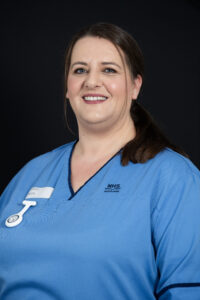
© Lesley Martin 2023
International Day of the Midwife is a day to celebrate the compassion, dedication and expertise of our wonderful midwives across the globe. In this blog we hear from Queen’s Nurse and Midwife, Claire Pearse about her work and the role midwives play in supporting sustainability.
My name is Claire Pearse and I have been a midwife for 25 years. I currently work in NHS Tayside community. As part of my role, I provide antenatal care and education to a caseload of parents to be in community clinics.
I am also honoured to be a Queen’s Nurse. As part of this role, I support women that do not use English as their first language. I provide holistic care for women that do not speak English and address their physical, emotional, cultural and linguistic needs to ensure a positive pregnancy experience.
Offering comprehensive antenatal education in the woman’s preferred language helps her to make informed decisions about her pregnancy, birth and postnatal care. I am currently working to make changes around more frequent use of interpreters, antenatal education, provision of information in the person’s first language and to ensure that women feel included, heard and empowered.
This includes providing information about pregnancy, nutrition, exercise, smoking, childbirth preparation, FGM, domestic violence, breastfeeding, and newborn care in a culturally sensitive and linguistically appropriate manner.
Tayside has some wonderful resources to help support the international community and I work closely with the Dundee International Women’s centre. I provide antenatal education there in a welcoming, friendly, and inclusive environment. The women enjoy coming to the centre and they have a wealth of support, parenting classes, friendship groups, and can be signposted to legal and financial information. There are also English classes and information which aids the facilitation of social support. Attending the centre can help to reduce social isolation and be an anchor point for women and their families.
This year’s theme on International day of the Midwife is Midwives: a vital climate solution. As midwives, we all have an important part to play in reducing environmental impact whilst maintaining high quality care.
We provide parent education in the heart of the community throughout NHS Tayside. Taking parent education to the women reduces the need for transportation and the infrastructure associated with more hospital visits and can help to reduce carbon emissions.
We promote a more natural birth experience at home, or in the Dundee Midwifery unit. As midwives we encourage women to have water births and support women with their choices regarding non- pharmacological pain management techniques.
Breastfeeding supports sustainability in many ways. It has a reduced environmental impact, helps with conservation of natural resources (it is renewed by mum), has a lower carbon footprint, and helps to reduce waste.
It also has long term health benefits to both mum and baby. The health benefits gained by mum and baby can lead to less of a burden on healthcare services and promotes more sustainable health in the population.
Breastfeeding requires minimal resources in comparison to bottle feeding, which involves the production, packaging, and transportation of infant formula as well as the disposal of the plastic bottles once they are no longer in use. By exclusively breastfeeding, mums will reduce the environmental footprint associated with the manufacturing and disposal of bottle feeding products.
Reusable nappies significantly reduce the amount of waste sent to landfill in comparison to disposable nappies. Disposable nappies can take hundreds of years to decompose while cloth nappies can be washed and reused. Reusable nappies can be costly initially but in the long run they are more cost effective and can be used by subsequent children.
Midwives play an important part in promoting sustainability within the NHS. By embracing sustainable practices such as promoting normal birth and breastfeeding, midwives contribute to the overall health to not only the people in their care, but the planet.